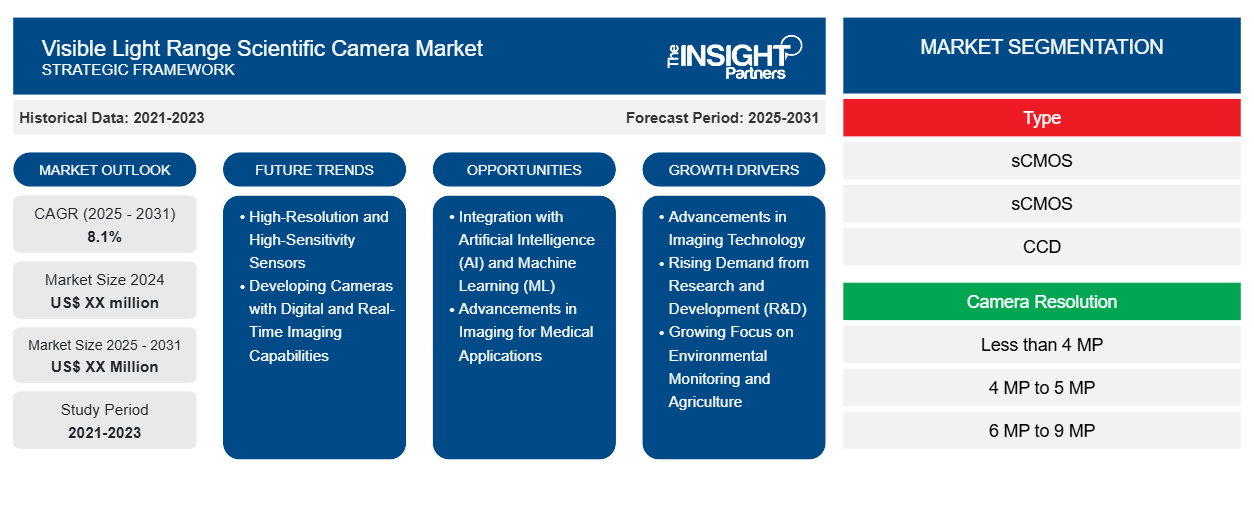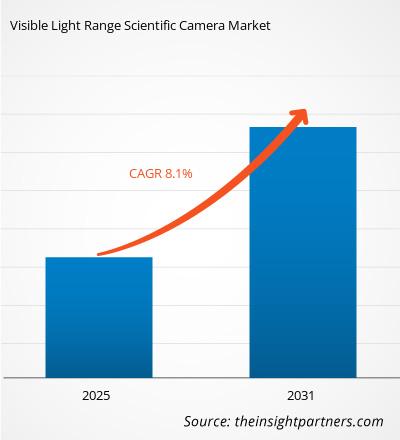Visible Light Range Scientific Camera Market Growth, Top Players, and Forecast by 2031
Visible Light Range Scientific Camera Market Size and Forecasts (2021 - 2031), Global and Regional Share, Trends, and Growth Opportunity Analysis Report Coverage : By Type (sCMOS, sCMOS (Backthinned), CCD, CCD (Backthinned), EMCCD); Camera Resolution (Less than 4 MP, 4 MP to 5 MP, 6 MP to 9 MP, and More than 9 MP)
Historic Data: 2021-2023 | Base Year: 2024 | Forecast Period: 2025-2031- Report Date : Apr 2026
- Report Code : TIPRE00039671
- Category : Electronics and Semiconductor
- Status : Upcoming
- Available Report Formats :


- No. of Pages : 150
The Visible Light Range Scientific Camera Market is expected to register a CAGR of 8.1% from 2025 to 2031, with a market size expanding from US$ XX million in 2024 to US$ XX Million by 2031.
The report is segmented by Type (sCMOS, sCMOS (Backthinned), CCD, CCD (Backthinned), EMCCD); Camera Resolution (Less than 4 MP, 4 MP to 5 MP, 6 MP to 9 MP, and More than 9 MP). The global analysis is further broken-down at regional level and major countries. The report offers the value in USD for the above analysis and segments
Purpose of the Report
The report Visible Light Range Scientific Camera Market by The Insight Partners aims to describe the present landscape and future growth, top driving factors, challenges, and opportunities. This will provide insights to various business stakeholders, such as:
- Technology Providers/Manufacturers: To understand the evolving market dynamics and know the potential growth opportunities, enabling them to make informed strategic decisions.
- Investors: To conduct a comprehensive trend analysis regarding the market growth rate, market financial projections, and opportunities that exist across the value chain.
- Regulatory bodies: To regulate policies and police activities in the market with the aim of minimizing abuse, preserving investor trust and confidence, and upholding the integrity and stability of the market.
Visible Light Range Scientific Camera Market Segmentation
Type
- sCMOS
- sCMOS
- CCD
- CCD
- EMCCD
Camera Resolution
- Less than 4 MP
- 4 MP to 5 MP
- 6 MP to 9 MP
- More than 9 MP
Customize This Report To Suit Your Requirement
Get FREE CUSTOMIZATIONVisible Light Range Scientific Camera Market: Strategic Insights

-
Get Top Key Market Trends of this report.This FREE sample will include data analysis, ranging from market trends to estimates and forecasts.
Visible Light Range Scientific Camera Market Growth Drivers
- Advancements in Imaging Technology: The increasing sophistication of sensor technologies such as CMOS (complementary metal-oxide-semiconductor) and CCD (charge-coupled device) is a key driver. These sensors offer better resolution, enhanced sensitivity, and greater efficiency, allowing for higher-quality imaging across a wide spectrum of applications. Innovations like back-illuminated sensors and increased pixel density have improved the performance of visible light cameras, making them more attractive for scientific use.
- Rising Demand from Research and Development (R&D): Universities, research institutes, and corporate R&D departments increasingly rely on high-quality scientific imaging for their experiments. This encompasses applications in fields such as biology, chemistry, physics, material science, and environmental research. The need for detailed, precise images to analyze samples, detect small variations, or observe phenomena is fueling the demand for visible light range cameras.
- Growing Focus on Environmental Monitoring and Agriculture: Cameras in the visible light range play a crucial role in fields like environmental science, agriculture, and ecology. Monitoring ecosystems, weather patterns, and agriculture crops benefits from clear imaging to analyze plant health, detect environmental changes, or perform land mapping. The increasing need for accurate environmental data is driving market expansion in these sectors.
Visible Light Range Scientific Camera Market Future Trends
- High-Resolution and High-Sensitivity Sensors: A dominant trend is the increasing demand for high-resolution cameras capable of capturing fine details. In fields like astronomy, materials science, and biomedical research, the ability to capture high-resolution images is critical. The trend toward cameras with high sensitivity to low light (through technologies like low-noise sensors) is gaining importance, as it allows for clearer imaging in dim environments.
- Developing Cameras with Digital and Real-Time Imaging Capabilities: The trend towards digital imaging solutions and real-time image processing is significant. Many industries, particularly in medical diagnostics and industrial inspections, require real-time feedback from scientific cameras. This enables faster decision-making and more immediate responses to observed phenomena, a trend that is being propelled by the development of faster processors and more efficient image sensors.
Visible Light Range Scientific Camera Market Opportunities
- Integration with Artificial Intelligence (AI) and Machine Learning (ML): The combination of visible light cameras with AI and ML algorithms is opening up new opportunities. These technologies can enhance image processing and analysis, enabling faster and more accurate results, such as automating the identification of patterns or anomalies in large datasets. AI-enhanced cameras are particularly beneficial in healthcare (medical imaging) and industrial inspections, where detecting subtle changes is crucial.
- Advancements in Imaging for Medical Applications: With the growing demand for non-invasive diagnostic tools, there is an opportunity for visible light cameras in the medical field. Applications like endoscopy, microscopy, and dermatology imaging are seeing increased usage of high-definition visible light cameras for detailed diagnosis. Cameras integrated with advanced optics and precise lighting systems are becoming critical for improving patient outcomes.
Visible Light Range Scientific Camera Market Report Scope
| Report Attribute | Details |
|---|---|
| Market size in 2024 | US$ XX million |
| Market Size by 2031 | US$ XX Million |
| Global CAGR (2025 - 2031) | 8.1% |
| Historical Data | 2021-2023 |
| Forecast period | 2025-2031 |
| Segments Covered |
By Type
|
| Regions and Countries Covered |
North America
|
| Market leaders and key company profiles |
|
Visible Light Range Scientific Camera Market Players Density: Understanding Its Impact on Business Dynamics
The Visible Light Range Scientific Camera Market is growing rapidly, driven by increasing end-user demand due to factors such as evolving consumer preferences, technological advancements, and greater awareness of the product's benefits. As demand rises, businesses are expanding their offerings, innovating to meet consumer needs, and capitalizing on emerging trends, which further fuels market growth.

Key Selling Points
- Comprehensive Coverage: The report comprehensively covers the analysis of products, services, types, and end users of the Visible Light Range Scientific Camera Market, providing a holistic landscape.
- Expert Analysis: The report is compiled based on the in-depth understanding of industry experts and analysts.
- Up-to-date Information: The report assures business relevance due to its coverage of recent information and data trends.
- Customization Options: This report can be customized to cater to specific client requirements and suit the business strategies aptly.
The research report on the Visible Light Range Scientific Camera Market can, therefore, help spearhead the trail of decoding and understanding the industry scenario and growth prospects. Although there can be a few valid concerns, the overall benefits of this report tend to outweigh the disadvantages.
Frequently Asked Questions
Naveen is an experienced market research and consulting professional with over 9 years of expertise across custom, syndicated, and consulting projects. Currently serving as Associate Vice President, he has successfully managed stakeholders across the project value chain and has authored over 100 research reports and 30+ consulting assignments. His work spans across industrial and government projects, contributing significantly to client success and data-driven decision-making.
Naveen holds an Engineering degree in Electronics & Communication from VTU, Karnataka, and an MBA in Marketing & Operations from Manipal University. He has been an active IEEE member for 9 years, participating in conferences, technical symposiums, and volunteering at both section and regional levels. Prior to his current role, he worked as an Associate Strategic Consultant at IndustryARC and as an Industrial Server Consultant at Hewlett Packard (HP Global).
- Historical Analysis (2 Years), Base Year, Forecast (7 Years) with CAGR
- PEST and SWOT Analysis
- Market Size Value / Volume - Global, Regional, Country
- Industry and Competitive Landscape
- Excel Dataset
Recent Reports
Testimonials
The Insight Partners' SCADA System Market report is comprehensive, with valuable insights on current trends and future forecasts. The team was highly professional, responsive, and supportive throughout. We are very satisfied and highly recommend their services.
RAN KEDEM Partner, Reali Technologies LTDsI requested a report on a very specific software market and the team produced the report in a few days. The information was very relevant and well presented. I then requested some changes and additions to the report. The team was again very responsive and I got the final report in less than a week.
JEAN-HERVE JENN Chairman, Future AnalyticaWe worked with The Insight Partners for an important market study and forecast. They gave us clear insights into opportunities and risks, which helped shape our plans. Their research was easy to use and based on solid data. It helped us make smart, confident decisions. We highly recommend them.
PIYUSH NAGPAL Sr. Vice President, High Beam GlobalThe Insight Partners delivered insightful, well-structured market research with strong domain expertise. Their team was professional and responsive throughout. The user-friendly website made accessing industry reports seamless. We highly recommend them for reliable, high-quality research services
YUKIHIKO ADACHI CEO, Deep Blue, LLC.This is the first time I have purchased a market report from The Insight Partners.While I was unsure at first, I visited their web site and felt more comfortable to take the risk and purchase a market report.I am completely satisfied with the quality of the report and customer service. I had several questions and comments with the initial report, but after a couple of dialogs over email with their analyst I believe I have a report that I can use as input to our strategic planning process.Thank you so much for taking the extra time and making this a positive experience.I will definitely recommend your service to others and you will be my first call when we need further market data.
JOHN SUZUKI President and Chief Executive Officer, Board Director, BK TechnologiesI wish to appreciate your support and the professionalism you displayed in the course of attending to my request for information regarding to infectious disease IVD market in Nigeria. I appreciate your patience, your guidance, and the fact that you were willing to offer a discount, which eventually made it possible for us to close a deal. I look forward to engaging The Insight Partners in the future, all thanks to the impression you have created in me as a result of this first encounter.
DR CHIJIOKE ONYIA MANAGING DIRECTOR, PineCrest Healthcare Ltd.Reason to Buy
- Informed Decision-Making
- Understanding Market Dynamics
- Competitive Analysis
- Identifying Emerging Markets
- Customer Insights
- Market Forecasts
- Risk Mitigation
- Boosting Operational Efficiency
- Strategic Planning
- Investment Justification
- Tracking Industry Innovations
- Aligning with Regulatory Trends





 Get Free Sample For
Get Free Sample For